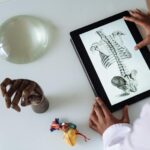'13 Essential Job Duties of a Nurse Explained' offers a detailed exploration of the critical functions and obligations inherent in the nursing profession. This insightful piece delves into the multifaceted responsibilities of nurses, encompassing patient care, medication administration, collaboration with healthcare teams, diagnostic procedures, and patient education. Serving as a valuable resource for those committed to the noble pursuit of caring for others, the article sheds light on the indispensable role of nurses in the healthcare landscape. By emphasizing the essential skills and attributes vital for success in this field, it provides a comprehensive understanding of the diverse facets of nursing. Whether aspiring to enter the profession or seeking to enhance one's knowledge, this article presents a wealth of information on the pivotal role of nurses in delivering exceptional healthcare.
Record Medical History and Symptoms
How do nurses accurately document patients' medical history and symptoms to ensure proper treatment and care? Nurses play a crucial role in recording patients' medical history and symptoms, ensuring that accurate and detailed information is documented. By asking patients about their medical history and symptoms, nurses are able to update medical records with the most current and relevant information. This meticulous process is essential for providing proper treatment and care, as it allows healthcare professionals to observe and record symptoms and information accurately. The recorded medical history and symptoms serve as a foundation for developing a comprehensive understanding of the patient's health status, aiding in the identification of potential health concerns, and informing the course of treatment. Ultimately, the accurate documentation of patients' medical history and symptoms is fundamental to delivering high-quality, personalized care.
Administer Medications and Treatments
Nurses are responsible for administering medications and treatments as prescribed by physicians or as per their specialized nursing practice. This crucial task involves ensuring that the correct medications and dosages are administered to patients. Nurses also play a key role in developing treatment plans, which may include wound care, catheter insertion, and emergency care for critically ill patients. Additionally, specialized nurses may have the authority to prescribe medications, further expanding their responsibilities in patient care. It is essential for nurses to maintain IV lines, monitor vital signs, and observe and record symptoms and information accurately. They must also pay attention to nonverbal cues from patients to provide the best possible care. Administering medications and treatments is a fundamental aspect of a nurse's role in ensuring the well-being of their patients.
Collaborate With Teams for Patient Care
In addition to administering medications and treatments, nurses collaborate with interdisciplinary teams to ensure comprehensive and patient-centered care. This collaboration is essential for delivering high-quality patient care and addressing the diverse needs of individuals. Here are three crucial aspects of nurses' collaboration with teams for patient care:
- Effective Communication: Nurses must possess strong communication skills to collect and share critical patient information with the medical team, ensuring that everyone involved in the patient's care is well-informed.
- Advocating for Patient-Centered Care: Collaboration with interdisciplinary teams allows nurses to advocate for patient-centered care, ensuring that the unique needs and preferences of each patient are addressed.
- Contributing to Accurate Patient Care: Nurses play a pivotal role in sharing findings from diagnostic tests with the medical team, contributing to accurate and personalized patient care.
Perform Diagnostic Tests
When performing diagnostic tests, nurses utilize their specialized skills to accurately assess patients' health status and inform the development of personalized care plans. They perform diagnostic tests with precision and care, ensuring that each test is conducted according to professional standards. Additionally, nurses play a crucial role in ensuring that the patient understands the purpose and process of the diagnostic tests, providing them with the necessary information and support. The results of these tests are critical in guiding the medical team in providing the best possible care for the patient. Nurses also use their expertise to operate and interpret diagnostic tools and specialized machinery, enabling them to gather accurate and reliable data for the patient's diagnosis and subsequent treatment. This aspect of nursing is fundamental in delivering comprehensive and effective patient care.
Conduct Physical Examinations
Conducting thorough physical examinations is a fundamental aspect of a nurse's role in assessing and monitoring patients' health. Qualified nurses play a crucial role in this process by conducting comprehensive physical assessments to gather vital information about the patient's overall well-being. This involves examining various body systems, such as the cardiovascular, respiratory, and neurological systems, to ensure a holistic understanding of the patient's health status. During physical examinations, nurses are responsible for observing and documenting patients' vital signs, reflexes, and any abnormalities or concerns that may indicate underlying health issues. Additionally, nurses collect samples for analysis and pay close attention to detail to ensure accurate results during diagnostic tests, providing essential information for the medical team to create effective care plans.
Monitor Patients' Health
Nurses diligently monitor patients' vital signs and symptoms to assess their health status and ensure timely interventions for optimal care. This crucial aspect of nursing care involves observing and recording patients' physical and mental well-being. Monitoring vital signs, such as blood pressure, heart rate, temperature, and oxygen saturation, allows nurses to detect any deviations from the norm and take appropriate action. Additionally, nurses pay close attention to nonverbal cues and changes in patients' conditions, enabling them to provide accurate and personalized care. By maintaining IV lines and ensuring correct medications and dosages, nurses play a vital role in safeguarding patients' health. Collaboration with physicians and other healthcare professionals is essential for developing individualized care plans based on these patient observations, ultimately ensuring comprehensive and effective healthcare delivery.
Provide Support and Advice to Patients
Nursing professionals offer invaluable support and guidance to patients, helping them navigate through their healthcare journey with empathy and expertise. This involves providing emotional support, caring for patients, and utilizing excellent communication and interpersonal skills. The following are essential aspects of providing support and advice to patients:
- Emotional Support: Nurses offer empathy and comfort to patients, ensuring they feel understood and cared for during their healthcare experiences.
- Guidance and Advice: They deliver medical news with compassion, provide support during diagnoses, and offer coping strategies and resources for managing health conditions.
- Education and Empowerment: Nurses educate patients about their conditions and treatments, empowering them to actively participate in their healthcare decisions and manage their well-being.
Operate Medical Equipment
Operating medical equipment is a critical aspect of a nurse's role, requiring precision and expertise to ensure accurate patient care. Nurses work with various diagnostic tools such as stethoscopes and thermometers to assess patients' conditions. Additionally, depending on their license and specialization, nurses may operate specialized machinery like electrocardiograms or infusion pumps. The ability to use this equipment effectively is crucial for monitoring vital signs, administering medications, and conducting diagnostic tests. Strong technology and math skills are essential for nurses to operate and interpret the results from these medical devices. Ultimately, the nurse's proficiency in operating medical equipment directly impacts the quality of care provided to patients, making it an indispensable skill in the healthcare setting.
Educate Patients About Managing Illnesses
Patients' understanding of managing their illnesses is a crucial aspect that nurses focus on during their care. Nurses work diligently to educate patients about managing their illnesses through various means:
- Providing clear and understandable information about their specific health condition, including symptoms, treatment options, and potential complications.
- Offering practical guidance on medication management, including dosage, frequency, and potential side effects, to ensure patients adhere to their treatment plans effectively.
- Equipping patients with self-care strategies and lifestyle adjustments to better manage their illnesses, such as dietary changes, exercise recommendations, and stress management techniques.
Advocate for Patient Health and Well-Being
Advocating for patient health and well-being is a fundamental responsibility of nurses in providing comprehensive and compassionate care. Nurses must actively advocate for patient health and well-being by ensuring that their overall health needs are met. This involves not only addressing their physical ailments but also considering their emotional and psychological well-being. Nurses advocate for patients' rights, ensuring that their preferences and concerns are acknowledged and integrated into their care plans. They collaborate with interdisciplinary teams to advocate for the best possible outcomes for their patients, working to ensure that their voices are heard and their needs are met. By embodying the role of an advocate for patient well-being, nurses play a crucial part in empowering patients to actively participate in their own care and make informed decisions about their health.
Provide Basic Bedside Care
Nurse's provision of basic bedside care is a foundational aspect of their role in ensuring patients' comfort and well-being. This crucial aspect of nursing involves several key responsibilities, including:
- Assisting with Activities of Daily Living: Registered nurses play a vital role in helping patients with tasks such as bathing, dressing, and feeding, ensuring their basic needs are met with dignity and compassion.
- Monitoring Vital Signs and Reflexes: Nurses diligently observe and record patients' vital signs and reflexes, providing essential data for the healthcare team to assess and address the patients' condition effectively.
- Supporting Patient Mobility: Nurses aid in the mobilization of patients, preventing complications associated with immobility and promoting faster recovery through gentle exercises and assistance with walking.
In fulfilling these duties, nurses exemplify the heart of nursing by providing holistic care to patients.
Train and Educate Staff
Regularly, nurses are responsible for training and educating staff members to ensure competence and adherence to best practices in healthcare. As nurse specialists, they play a vital role in providing ongoing professional development for healthcare staff, ensuring they stay updated on the latest advancements in nursing practice. This involves imparting knowledge on new medical technologies, treatments, and protocols, as well as honing their communication skills for effective patient interaction. Nurses also facilitate training in areas such as patient advocacy, ethical decision-making, and interdisciplinary collaboration. By sharing their expertise, nurses contribute to the overall improvement of patient care quality within healthcare facilities. In essence, their role in training and educating staff members is crucial for maintaining high standards of care and promoting a culture of continuous learning and improvement in healthcare settings.
Maintain Inventory
To effectively fulfill their responsibilities, nurses must consistently maintain an accurate and updated inventory of medical supplies and medications. This involves monitoring stock levels, reordering supplies as needed, and organizing and storing medical equipment and supplies for easy accessibility. Nurses also collaborate with medical teams to assess inventory needs and coordinate procurement to ensure that essential supplies are always available. Verbal and written communication skills are crucial in conveying inventory needs to relevant stakeholders, and problem-solving abilities are essential for identifying and addressing any inventory issues that may arise. Attention to detail is also paramount to accurately document inventory transactions and adhere to organizational protocols, ensuring a seamless supply chain for patient care.






